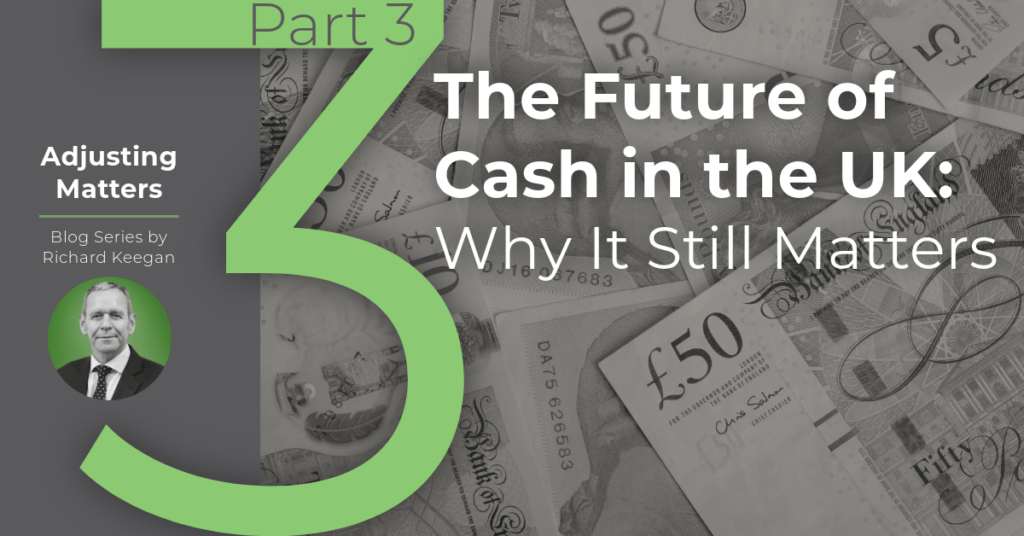By: Richard Keegan | From the Adjusting Matters Blog Series | Part 3 – The Future of Cash in the UK: Why It Still Matters
As the world continues its shift toward digital payments, the role of physical cash remains a critical, often underestimated pillar of financial access, business continuity, and national resilience.
At Adjusteck and across the Lowers Risk Group ecosystem, we deal with cash-related risk and loss every day. Naturally, we keep a close eye on the evolving conversation around cash usage and its future in society. That conversation was recently revived by the UK House of Commons Treasury Committee, which released a timely report on the role of cash in the UK economy.
Their findings arrive just as stakeholders from across Europe prepare to meet at the European Secure Transport Association (ESTA) conference, where the fate of cash remains a central topic.
So, what’s the current state of play, and what are the implications for businesses, communities, and national infrastructure?
Current Regulatory Safeguards
As of 2024, the UK’s only regulation protecting cash access comes from the Financial Conduct Authority (FCA). It requires banks and building societies to assess and address significant gaps in cash access for consumers and businesses. The language of the regulation may be open to interpretation, but it does compel action where service shortfalls are identified.
The Decline of Cash: Slowing, Not Reversing
Cash usage has declined sharply in the past decade, driven by electronic payment trends and accelerated by the pandemic. According to the British Retail Consortium, cash transactions fell from 53% in 2013 to just 15% in 2021, before rebounding slightly to 20% in 2023.
Interestingly, even sectors with traditionally high cash volume, like convenience stores, are seeing change. The Association of Convenience Stores noted that in 2024, card payments surpassed cash for the first time, although the pace of change is slowing.
Why Some Communities Still Depend on Cash
Despite national trends, cash remains essential for many, particularly vulnerable or marginalized groups. The Treasury Committee’s review identified several key demographics who still rely heavily on cash:
- Low-income individuals who use cash for budgeting.
- The unbanked, including around 1.1 million UK adults, often excluded by ID requirements or digital access barriers.
- Older adults, many of whom lack the digital literacy or confidence to manage online banking.
- People with learning disabilities, who face digital accessibility challenges.
- Survivors of economic abuse, who need untraceable spending options for safety.
- Children, for whom cash remains a valuable financial literacy tool.
Strikingly, a 2023 survey found that 71% of British adults want legislation guaranteeing the right to use cash. And a legal question is now emerging: could refusing to accept cash be considered discrimination under the Equality Act 2010?
What About Businesses?
It’s often assumed that digital payments are cheaper for businesses, but the numbers tell a more nuanced story.
G4S estimates that for a small business handling £20,000 in weekly cash, the annualized cost of cash (with smart safe use) falls between 0.63% and 1.14%. By contrast, Mastercard puts the average cost of card acceptance at 2.4%.
As businesses scale beyond £1.5 million annually, costs for both methods converge. But for many smaller businesses, cash remains the most cost-effective payment option. The British Retail Consortium has also confirmed that electronic payment costs continue to rise.
Moreover, cash acts as a natural price-control mechanism in the payment ecosystem. Its continued availability helps keep card processing fees in check.
Cash as a Resilience Asset
From a national security perspective, cash isn’t just a payment method, it’s a backup system.
The UK’s National Risk Register lists system failures at major banks or payment processors as material threats. Between January 2023 and February 2024 alone, there were at least 158 UK banking IT outages. During such disruptions, Post Office branches reported sharp increases in cash withdrawals.
Maintaining the ability to transact with cash is, therefore, a key component of national resilience in the face of cyberattacks or infrastructure failure.
Learning from Abroad
Sweden’s attempt to go fully cashless offers a cautionary tale. Their central bank ultimately concluded that phasing out cash too quickly left vulnerable groups behind and posed risks to civil resilience. They’ve since backed legislation requiring merchants to accept cash for essential goods and services.
Meanwhile, the EU has proposed regulation (not yet adopted) to ensure continued access to and acceptance of cash. France has already taken a firm stance, refusing to accept cash is prohibited by law.
Key Takeaways
- Cash usage in the UK has declined but stabilized at around 20% of retail transactions.
- Certain populations still depend on cash, and removing it risks social exclusion and discrimination.
- Cash remains cost-competitive for small businesses and serves as a check on card processing fees.
- From a risk perspective, cash supports operational resilience when digital systems fail.
- International trends show a growing recognition of the need to protect cash infrastructure.
Final Thoughts
For insurers, retailers, banks, and secure transport providers, the future of cash isn’t just a social issue, it’s a strategic one. As regulators continue to debate the balance between digital efficiency and public access, businesses must prepare for a hybrid payment environment.
At Adjusteck, we continue to monitor these developments closely and support our clients in managing the operational, financial, and resilience risks tied to evolving payment infrastructures.
Want to explore how these changes might impact your risk profile or claims strategy?
Get in touch with our experts to start the conversation:
Richard Keegan
FCCA FCILA
Senior Executive Adjuster Accountant
Jonathan Cooper
MSc CMgr FCMI Dip CILA
Loss Adjuster & Pre-Risk Surveyor






